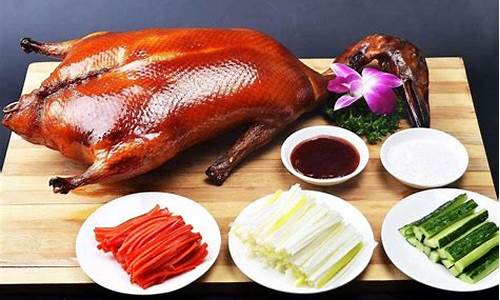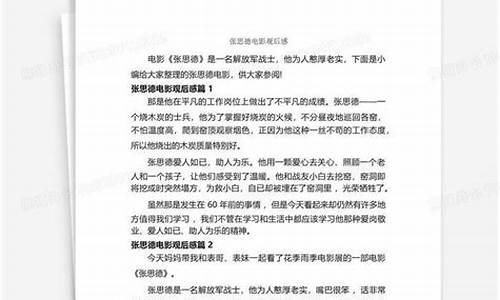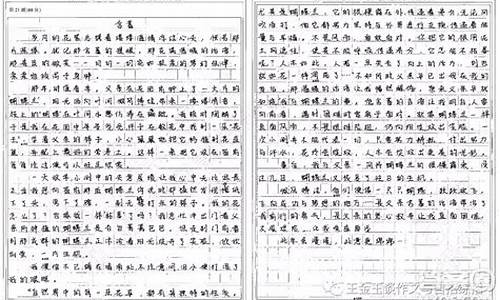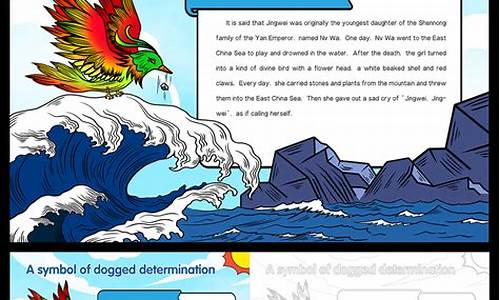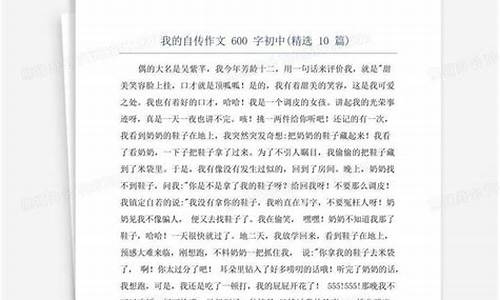清明节的小短文_清明节的小短文150字
1.清明节英语短文
2.关于清明节的英语小短文
3.把杜甫的清明改写成一篇以描写节日风俗为主的小短文
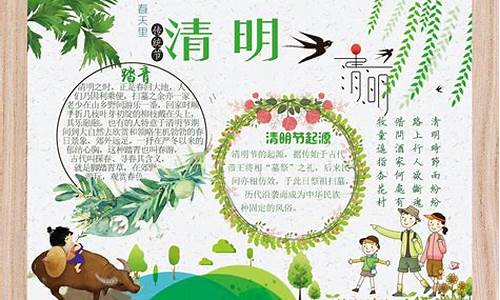
清明节来了,总是春雨绵绵。在雨的清洗下,杨柳变青了几分,柳条也婀娜多姿,在春风的吹动下跳起了秧歌舞。大地上一大片一大片满是绿。多美的春色!
老水牛,放牛娃在湖边,欣赏青春的美丽景色。此时,一位书生蹒跚地走过来,穿着白色的外衣,头戴“太白”帽,抚着不算太长的胡须。可能是清明节吧!使他变得神思茫然,他可能是去怀念故去的人。走在稀稀疏疏的人流中,他显得格外醒目。这时书生走了过来,恭恭敬敬地向放牛娃行了个礼,说道:“请问小哥,附近哪儿有酒家?”放牛娃放下短笛,想:可能他是借酒消愁,迫不及待地寻找酒店吧!于是,他骑上牛背,伸手指向了不远处的杏花村,那个杏花村可是远近闻名的村庄,专产好酒。书生听了,忙忙道谢。之后,露出了久违的笑容,走向了那个神秘的地方——“杏花村!”
清明节英语短文
清明节的英语小短文如下:
1、On each Qingming Festival,all cemeteries are crowded with people who came to sweep tombs and offer sacrifices.Traffic on the way to the cemeteries bees extremely jammed. The customs he been greatly simplified today.After slightly sweeping the tombs,people offer food, flowers and forites of the dead,then burn incense and paper money and bow before the memorial tablet.
This is the most important day of sacrifice. Both the Han and minority ethnic groups at this time offer sacrifices to their ancestors and sweep the tombs of the diseased.Also,they will not cook on this day and only cold food is served.
翻译:每到清明节,所有的墓地都挤满了前来扫墓和祭祀的人。去墓地的路上交通非常拥挤。今天的习俗已经大大简化了。稍微扫墓后,人们提供食物,鲜花和死者的最爱,然后焚香和纸钱,并在牌位前鞠躬。
这是最重要的祭祀日。汉族和少数民族都在这个时候祭祖和扫墓。此外,他们不会在这一天做饭,只有冷的食物供应。
2、Qing Ming, which means clear and bright in Chinese, falls on April 5th this year. It is both the fifth term in the traditional lunar calendar and a festival to hold memorial ceremony for the dead. It is a time to express one's grief for his lost relatives. An ancient elegiac poem, which described a grievous woman, was read that vines tangled in vain and weeds crept in the greyard, and her husband slept there lonely. It was so difficult to endure for her as if summer in the day and winter at night. And her only wish was to reunite with him after death.
翻译:清明,这意味着在中国清晰明亮,适逢今年四月五日。这是第五学期在传统的农历和节为死者举行纪念仪式。这是一个时间来表达自己的悲痛,他失去了亲人。一个古老的挽歌诗,它描述了一个严重的女人,改为葡萄纠缠徒劳和杂草在坟墓里,和她的丈夫睡有寂寞。这是很难忍受的她好像晚上在夏季和冬季的一天。和她的愿望是与他团聚后死亡。
3、People often go to sweep and weed gres with whole family and take a walk in the countryside as well. In Tang Dynasty, the habit of taking an excursion on this day was developed. At this time, spring returns and dominates the earth again. The feel of growing life is in the air, with sap ascending in trees and buds bursting. And the willow branches inserted on each gate add vigor and vitality to the surroundings. But it actually means more than that. This custom can be traced back to over one thousand years ago.
翻译:人们经常去打扫和全家杂草的坟墓,走在乡间的好。在唐代,在这一天取游览习惯发展。在这个时候,春天的回报,主宰了地球一次。生命的感觉弥漫在空气中,与SAP升序的树木和花蕾绽放。和插在每门增添生机和活力的环境的柳树的枝条。但它实际上意味着更多。这种风俗可以追溯到一千年前。
清明节?
清明节?4月5日(二月十五)清明节是传统的重大春祭节日,扫墓祭祀、缅怀祖先,是中华民族数千年以来的优良传统,不仅有利于弘扬孝道亲情、唤醒家族共同记忆,还可促进家族成员乃至民族的凝聚力和认同感。
关于清明节的英语小短文
清明节英语短文如下:
范文一:
The qingming festival is also called the qingming festival, in the middle spring and the late spring, which is the 108 days after the winter solstice. It is one of the most important festivals in China.?
It is a time for ancestor worship and tomb sweeping. The traditional qingming festival of the Chinese nation began around the zhou dynasty, which has a history of more than 2,500 years.
清明节又叫踏青节,在仲春与暮春之交,也就是冬至后的第108天。是中国传统节日,也是最重要的祭祀节日之一,是祭祖和扫墓的日子。中华民族传统的清明节大约始于周代,距今已有二千五百多年的历史。
范文二:
Tomb-sweeping day is one of the important "age of 8" in China, usually in the Gregorian calendar before and after April 5, the feast is very long, there are 10 8 and 10 10 two versions in the future in the future, the nearly 20 days are tomb-sweeping day.?
The qingming festival was originally defined as 15 days after the spring equinox. In 1935, the of the republic of China decided to set April 5 as the national holiday qingming festival, also known as the national tomb-sweeping day.
清明节是中国重要的“时年八节”之一,一般是在公历4月5号前后,节期很长,有10日前8日后及10日前10日后两种说法,这近20天内均属清明节。清明节原是指春分后十五天,1935年中华民国明定4月5日为国定日清明节,也叫做民族扫墓节。
范文三:
Not only it is a day for commemorating the dead, is it also a festival for people to enjoy themselves. During March, everything in nature takes on a new look, as trees turn green, flowers blossom, and the sun shines brightly.?
It is a fine time to go out and to reciate the beautiful scenes of nature during the festival. Spring outings not only add joy to life but also promote a healthy body and mind.
清明节不仅仅是一个纪念故人的节日,人们也可以在这一天进行活动。在3月份,大自然焕然一新,树木变绿,花朵绽放,阳光普照。节日期间,大家可以好好地去感受一下自然的魅力。春游不仅能给生活带来愉悦,同时也可以促进身体和心灵的健康。
把杜甫的清明改写成一篇以描写节日风俗为主的小短文
关于清明节的英语小短文如下:
清明节是中华民族古老的节日,既是一个扫墓祭祖的肃穆节日,也是人们亲近自然、踏青游玩、享受春天乐趣的欢乐节日。
Qingming Festival is an ancient festival of the Chinese nation. It is not only a solemn festival of sweeping tombs and offering sacrifices to ancestors, but also a hy festival for people to get close to nature, go outing and enjoy the fun of spring.
清明节气时间在公历4月5日前后。这一时节,生气旺盛、阴气衰退,万物“吐故纳新”,大地呈现春和景明之象,正是郊外踏青春游与行清墓祭的好时节。
Qingming solar term time in the Gregorian calendar before and after April 5. In this season, the vitality is exuberant, the Yin Qi is declining, and all things "give up the old and accept the new". The Earth presents the image of spring and scenery. It is a good time for suburban youth trel and Qing Dynasty tomb sacrifice.
清明祭祖节期很长,有10日前8日后及10日前10日后两种说法,这近20天内均属清明祭祖节期内。
The Qingming ancestor worship Festival lasts for a long time. There are two kinds of sayings: 10 days before and 8 days after and 10 days before and 10 days after. These nearly 20 days belong to the Qingming ancestor worship Festival.
清明节这天,家家户户都忙着回家祭祖,老天也格外地伤心,“眼泪”落个不停,到处都烟雨蒙蒙,给这个令人悲伤的节日增添惆怅的气氛。 路上的行人满面哀伤,行色匆匆,几乎丢魂落魄。 这时的杜牧也行走在路上。他同样满面惆怅,想起别人都急急忙忙回家祭祖,自己却身在异乡,和亲人天各一方,无法团聚,一时忧愁无法排解。 走着走着,杜牧便想找个酒馆喝点酒,以便借酒浇愁。这时,不远处过来一位骑在牛背上的牧童,便上前问道:“请问,小朋友,你可知道哪儿有酒店吗?” 牧童用手指了指远处,说:“那儿,杏花村里有一家酒馆。” 诗人杜牧抬头望去,只见远处有一座美丽的村庄,那儿开满杏花——那就是杏花村。 杜牧在酒店喝到酒酣耳热的时候,不禁诗兴,叫小二拿来纸笔,悬腕挥毫,写下了《清明》。 清明时节雨纷纷,路上行人欲断魂。 借问酒家何处有,牧童遥指杏花村。
声明:本站所有文章资源内容,如无特殊说明或标注,均为采集网络资源。如若本站内容侵犯了原著者的合法权益,可联系本站删除。






